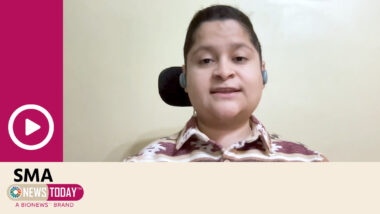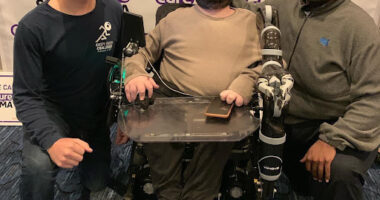
Rio Landa: Preparing your child for medical appointments
Rio Landa, whose 14-year-old son, Mateo, was diagnosed with SMA type 2 when he was a year old, discusses how she prepares him for medical appointments and clinic days and is teaching him to advocate for himself as he gets older.
Check out our other SMA empowerment videos:
 Find a specialist near you
Find a specialist near you
Transcript
I’m Rio Landa. I am the mom of a 14 — almost 15, as he reminds me every day — year-old boy with SMA type 2. He is very energetic, loves video games, school we’re working on, but does a really good job. And we live in North Carolina. I have a unique perspective in that I’m also a healthcare provider. I take care of adults in cardiology right now from the provider perspective. So I get a little bit of both worlds in what I do.
[Title slide]: How do you prepare your child for medical appointments/clinic days?
I think this is really important as, as Mateo gets older, you know, I really want him to be able to advocate for himself. I know that from a young age, we obviously learned he’s going to see lots of doctors. And I think it’s really important for him to be able to advocate for himself. I think that him being able to express how he feels, whether it’s something like he’s sick or he’s in pain, or he needs something or he’s uncomfortable, I think that’s really important for him to be able to advocate for himself, for him to be able to speak to the doctors and say ask if he doesn’t understand something, to ask if they use a word he doesn’t understand, or to repeat themselves, I think is super important. And I think that starts to set up the relationship.
I think really being able to express what I was hoping to get out of the appointment was really important. I think when he was first diagnosed, it was kind of what’s the next step, what’s the next step, and just making sure that I understood that, and then as he got a little older, I could articulate that to him in words that he understood.
But really from a parent perspective, I really think to prepare for the appointment, it was, what was I hoping to get out of the person I was meeting? Because it’s really important which stakeholder you’re seeing to, if you’re with neurology, it might be what new medicines we’re gonna learn about, or pulmonology — “Hey, he has a cough assist and a BiPAP and a vest machine; is there something new out there? Do we need to look at what’s next, what’s new?What other treatments are on the horizon?”
So I think that’s kind of how I would prepare and doing a little bit of research. I think social media is huge in that aspect. Being savvy, I really like to ask the community, hey, my son recently had a spinal fusion. That was huge. And I think reaching out to the community about strategies to ask for positioning or pain management or what to expect afterward. And so, kind of being able to know that and then make sure to ask the provider when I was there really helped.
I am also a big note-taker. My whole life I’ve been that way, so I will write stuff down and bring it with me and I am never afraid to do that, and from the provider perspective, I never mind when my patients do that either because I know that they can go home and not worry, did I forget to ask something? So I take lots of notes.
Recent Posts
- Guest Voice: My one job for cold and flu season is to not get sick
- Finding inspiration in the new year to make a positive impact
- High-dose Spinraza regimen approved in Europe for spinal muscular atrophy
- A spreadsheet reset helps me manage my caregiving team for the new year
- Ringing in the new year with public health insurance woes













